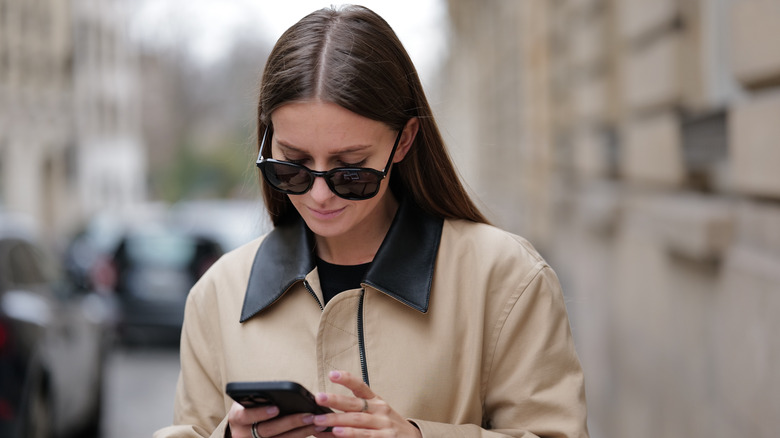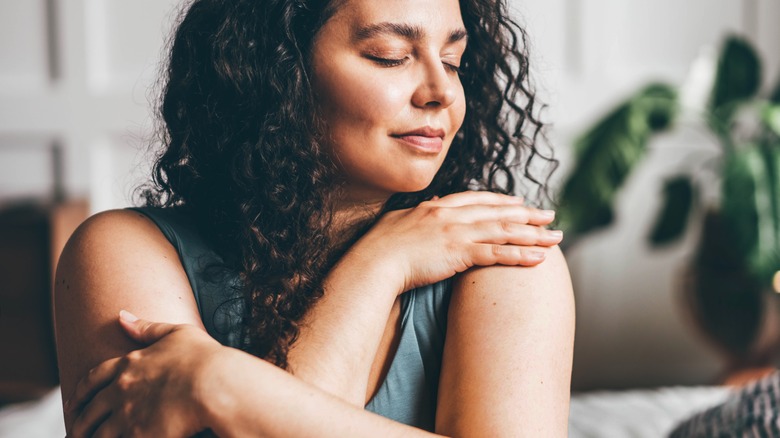Body Checking Might Seem Harmless, But Critics Say It's Modern 'Thinspo'
Body checking is a recurring trend on social media, particularly with visual sites like TikTok and Instagram. While the term is gaining traction in various discourses, the concept itself is actually nothing new. What is body checking, exactly? It's simply the action of analyzing one's body to obtain information about weight distribution, how you appear to an outside viewer, and fixating on certain areas of the body. Off social media, this can manifest through weighing oneself frequently, pinching body parts, or taking selfies to research how one's face, nose, jawline, waist, or any other body part looks in a photo compared to photos past. There's even a trend called "skinny girl check," where content creators share images of their bodies, to remind themselves or their followers that they're thin.
On TikTok, body checking shows up in countless forms. Some users post videos of themselves in loose clothing, only to pull back the oversized clothing to reveal a smaller body underneath. Other trends that amplify body checking include the hashtags #mydreambody and #myinsecurities. Often, these videos show the content creator's face or body followed by several images of other faces and bodies, reflecting a perceived ideal they wish they had. Body checking is made even more insidious by the fact it doesn't always include an explicit hashtag. The trend has its roots in the early Tumblr days, when users became focused on concepts like the thigh gap and protruding collarbones. Since then, any social media that hinges upon visual content has the capacity to exacerbate disordered eating and dissatisfaction with one's body, and body-checking content is a huge culprit in that area.
Why body checking is a serious reality
Body checking can take a serious toll on self-esteem. If we're creating content that involves body checking, it can stem from a perceived need for reassurance about a body part that makes us insecure. If we're observing body checking in our feed, it could lead to comparison and a lack of self-satisfaction. The problem is that body checking doesn't just happen when we're online; We carry the mindset into other parts of our lives. "When we body check offline, it's the elements of our body we dislike that we normally focus on," psychologist Dr. Lara Zibarras told Dazed Beauty. "Ultimately this results in a distorted perception of our body. It's this distorted perception, along with continuous negative thoughts about our bodies, that take up a lot of mental capacity which negatively impacts our ability to concentrate or think clearly."
What makes it even more problematic is that body checking is often disguised on TikTok. It's pitched as healthy eating, happy guts, or "What I Eat In A Day" content. Of course, not all content about healthy eating is "thinspo," and there are certainly helpful videos on the platform for those looking for more inspiration or structure in their cooking schedule. But, it can direct our attention to an unhappy body image much more easily. "Since the behavior is often used as a way to control weight or size, any perceived failure, for example, a change in shape or size, can then lead to lowered mood, low self-esteem and even more body dissatisfaction and self-critical thoughts, which then leads to more body checking and so the cycle continues," Dr. Zibarras said.
How do we combat the dark side of body checking?
Who takes on the burden to stop body checking and its toxic side effects? Should the blame fall on Tumblr circa 2010, or on TikTok and Instagram? Is it the responsibility of the content creators? Or is it on us for indulging in it? How can we prevent this trend from being so popular? Most importantly, how can we keep it away from vulnerable eyes? One positive thing that's surfaced is backlash from other content creators. TikTok user @healwithkailin has created several videos calling out body checking as fatphobia. Another account, @embodyhealthldn, gives tips for people recovering from eating disorders when they're triggered by body checking, like pruning who you choose to follow and getting rid of a scale.
For ourselves, one of the best courses of action is to completely ignore content that promotes body checking. Don't even pause to flag it, so as to prevent such content from appearing again in our feeds. But that's not so easy for more susceptible viewers.
The eating disorder organization Beat tells Refinery29 that the onus falls on TikTok and Instagram. "TikTok has a responsibility to protect vulnerable users from damaging content online by removing harmful videos, increasing transparency around their algorithms, and ensuring that users can have more control over the videos that they view," they said. Beat also noted that some content creators who lean on body checking may be struggling themselves, so calling them out might not work. We can do our part, but the social media giants themselves have work to do.
If you need help with an eating disorder or know someone who is, help is available. Visit the National Eating Disorders Association website or contact NEDA's Live Helpline at 1-800-931-2237. You can also receive 24/7 Crisis Support via text (send NEDA to 741-741).

